
Oleg Sobchuk 🇺🇦
@sobchuk.bsky.social
I use big data to research the cultural evolution of arts @ Max Planck Institute for Evolutionary Anthropology
More: https://www.sobch.uk/
More: https://www.sobch.uk/
My copy of the Oxford Handbook of Cultural Evolution has arrived! Looks gorgeous – and massive. And somewhere on page 554 (which is roughly the middle of the book 😅) you can find my chapter.
Big thanks to the editors for organizing this!
Big thanks to the editors for organizing this!


September 15, 2025 at 3:18 PM
My copy of the Oxford Handbook of Cultural Evolution has arrived! Looks gorgeous – and massive. And somewhere on page 554 (which is roughly the middle of the book 😅) you can find my chapter.
Big thanks to the editors for organizing this!
Big thanks to the editors for organizing this!
I happened to accidentally find this edited volume on quantitative approaches to literature, from 1969. Never heard of it - even though it was co-edited by one of the big figures in narratology: Lubomir Doležel (another surprise). The minimalist plots here are ⚡️




August 25, 2025 at 1:23 PM
I happened to accidentally find this edited volume on quantitative approaches to literature, from 1969. Never heard of it - even though it was co-edited by one of the big figures in narratology: Lubomir Doležel (another surprise). The minimalist plots here are ⚡️
This week I had a pleasure to present my research at Huygens Institute in Amsterdam. What a wonderful place, really! I preached my usual gospel about the cultural evolution of the arts. Mostly – about the decomposition analysis of literature (see royalsocietypublishing.org/doi/10.1098/...)
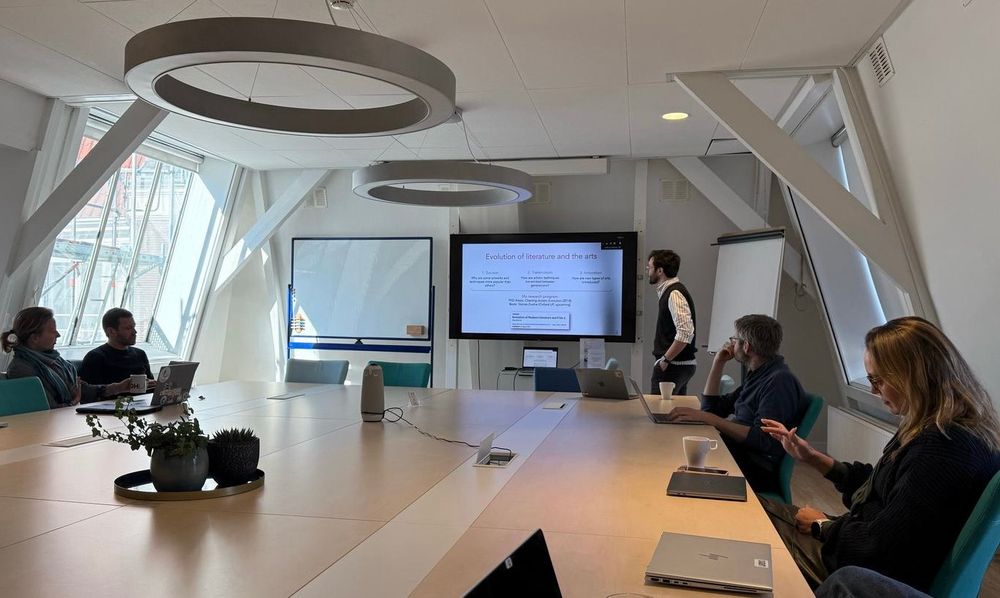

March 22, 2025 at 2:48 PM
This week I had a pleasure to present my research at Huygens Institute in Amsterdam. What a wonderful place, really! I preached my usual gospel about the cultural evolution of the arts. Mostly – about the decomposition analysis of literature (see royalsocietypublishing.org/doi/10.1098/...)
The #OpenAccess paper in @royalsociety.org Proceedings B can be found here: doi.org/10.1098/rspb...
Also, shoutout to my co-author @babeheim.bsky.social !
(8/8)
Also, shoutout to my co-author @babeheim.bsky.social !
(8/8)

February 5, 2025 at 2:53 PM
The #OpenAccess paper in @royalsociety.org Proceedings B can be found here: doi.org/10.1098/rspb...
Also, shoutout to my co-author @babeheim.bsky.social !
(8/8)
Also, shoutout to my co-author @babeheim.bsky.social !
(8/8)
Our finding: cohort turnover (🟦+🟥) is stronger than individual change (🟨): i.e writers don't change their topics much mid-career. This aligns with previous studies by @tedunderwood.me, @stephenvaisey.com, @oliviermorin.bsky.social, @wenyishang.bsky.social, @kkiley.bsky.social & F.Moretti. But… (6/8)
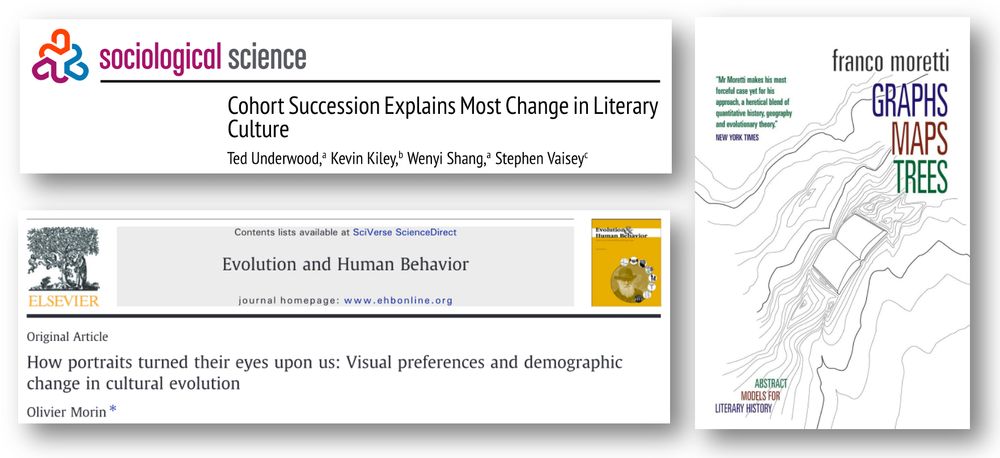
February 5, 2025 at 2:53 PM
Our finding: cohort turnover (🟦+🟥) is stronger than individual change (🟨): i.e writers don't change their topics much mid-career. This aligns with previous studies by @tedunderwood.me, @stephenvaisey.com, @oliviermorin.bsky.social, @wenyishang.bsky.social, @kkiley.bsky.social & F.Moretti. But… (6/8)
Next, we borrowed a method from evolutionary ecology: decomposition analysis. It allows “dissecting” a trendline of a topic into underlying forces. We looked at the impact of new authors starting their career (🟦), established authors retiring (🟥), & authors changing their topics mid-career (🟨) (5/8)
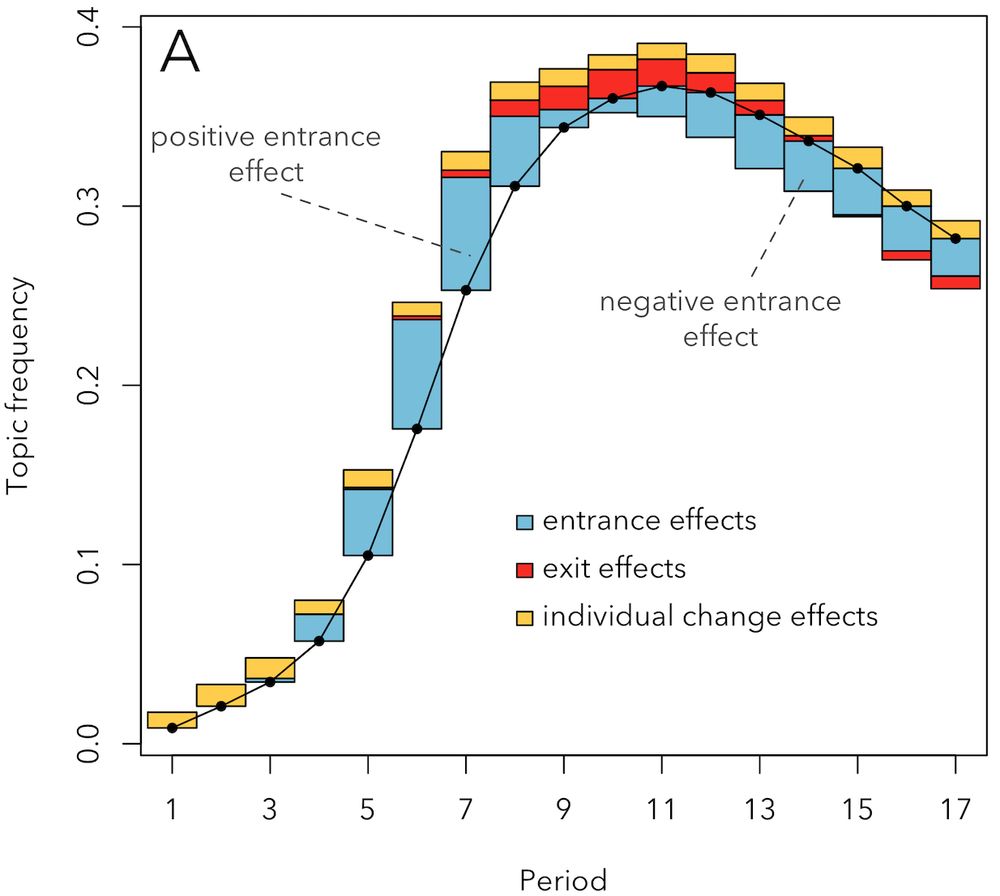
February 5, 2025 at 2:53 PM
Next, we borrowed a method from evolutionary ecology: decomposition analysis. It allows “dissecting” a trendline of a topic into underlying forces. We looked at the impact of new authors starting their career (🟦), established authors retiring (🟥), & authors changing their topics mid-career (🟨) (5/8)
We used a corpus of 23,000 books by 6000 authors. Then we algorithmically extracted 200 major topics that these authors were writing on. Such topics have clear temporal trajectories ⬇️ (4/8)
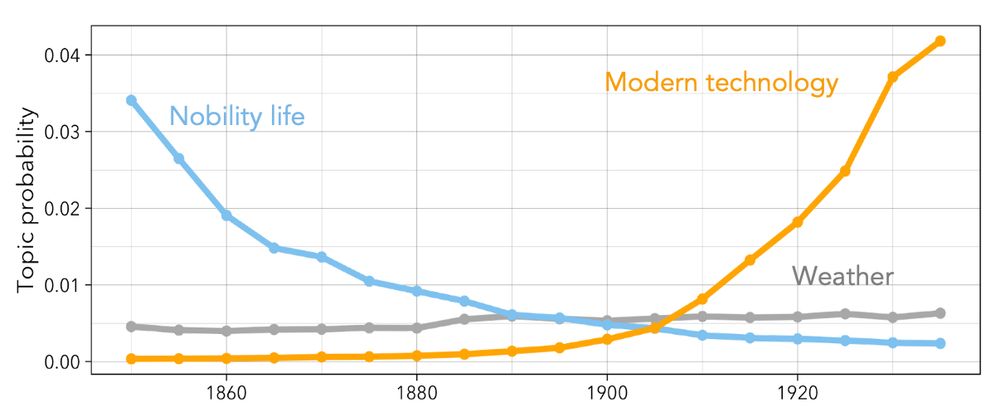
February 5, 2025 at 2:53 PM
We used a corpus of 23,000 books by 6000 authors. Then we algorithmically extracted 200 major topics that these authors were writing on. Such topics have clear temporal trajectories ⬇️ (4/8)
So, we considered two possibilities. (1) Individuals – say, writers – always learn, changing their topics, e.g. in response to significant events, like the moon landing. Or (2) authors don’t change much over their careers, and the topics of their books are shaped during their formative years (3/8)
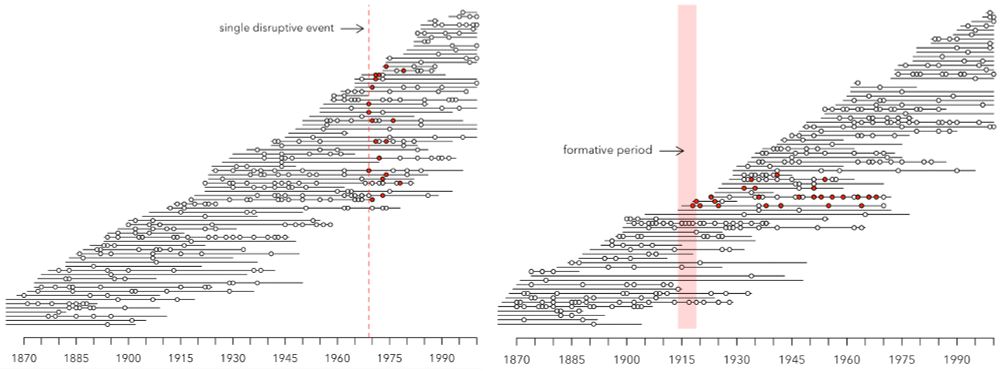
February 5, 2025 at 2:53 PM
So, we considered two possibilities. (1) Individuals – say, writers – always learn, changing their topics, e.g. in response to significant events, like the moon landing. Or (2) authors don’t change much over their careers, and the topics of their books are shaped during their formative years (3/8)
Max Planck (this guy ⬇️), who wasn't only interested in quantum physics, once wondered: “Does science advance one funeral at a time?” Literary scholar Franco Moretti also hypothesized that the rise and fall of book genres (e.g. gothic novel) is driven by the change of generations of writers (2/8)

February 5, 2025 at 2:53 PM
Max Planck (this guy ⬇️), who wasn't only interested in quantum physics, once wondered: “Does science advance one funeral at a time?” Literary scholar Franco Moretti also hypothesized that the rise and fall of book genres (e.g. gothic novel) is driven by the change of generations of writers (2/8)
Change over time is often depicted as a trendline. But what does shape a trendline? Which forces? Our new paper presents a method allowing to “decompose” trendlines into constituent forces. Also, we tackle an old puzzle: Does culture change “one funeral at a time”? 🧵(1/8) doi.org/10.1098/rspb...
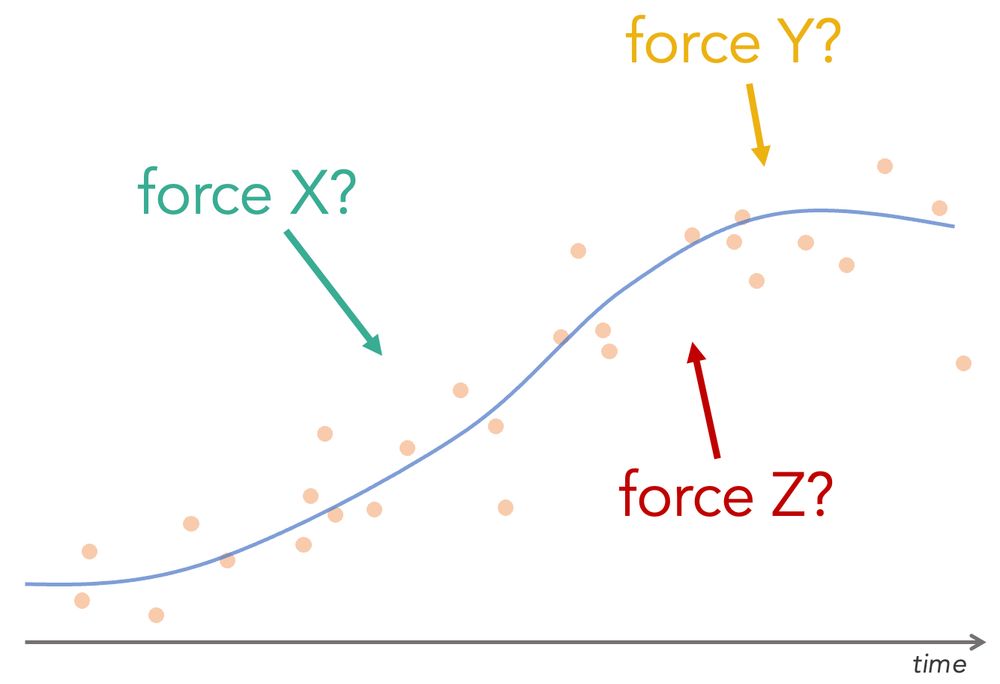
February 5, 2025 at 2:53 PM
Change over time is often depicted as a trendline. But what does shape a trendline? Which forces? Our new paper presents a method allowing to “decompose” trendlines into constituent forces. Also, we tackle an old puzzle: Does culture change “one funeral at a time”? 🧵(1/8) doi.org/10.1098/rspb...
Holy crap. I took a peek at what's happening on former Twitter. Is Musk drunk on power, or what? I was resisting removing my Twitter account, but, yikes, staying there isn't different from having an account on Truth Social – maybe even worse.

January 6, 2025 at 2:47 PM
Holy crap. I took a peek at what's happening on former Twitter. Is Musk drunk on power, or what? I was resisting removing my Twitter account, but, yikes, staying there isn't different from having an account on Truth Social – maybe even worse.
Why do some academic journals still have the section "Author Contributions" even when the paper is single-authored? Maybe this section is a good place to introduce one's ghostwriters? 😅

December 29, 2024 at 1:12 PM
Why do some academic journals still have the section "Author Contributions" even when the paper is single-authored? Maybe this section is a good place to introduce one's ghostwriters? 😅
No abstract supplied. Deal with it.
![A title and the [lack of] abstract for the article "Bacterial DNA in Clarkia fossils" by Arend Sidow, Allan C. Wilson and Svante Pääbo](https://cdn.bsky.app/img/feed_thumbnail/plain/did:plc:pp64ne6dqbhdiudhvfdtlnip/bafkreicvoxtoslu6ilzaxxdht74pz67zifnvil7zpaixildytp27zny7ri@jpeg)
December 10, 2024 at 12:04 PM
No abstract supplied. Deal with it.
I was quite early in here lol

September 17, 2024 at 12:42 PM
I was quite early in here lol
Hi everyone! You may know that sometimes I collect donations to buy things ⬇️ for the Kremenets battalion 🇺🇦, which is protecting the eastern front of Ukraine & which includes my relatives & schoolmates. Now they need help again (1/3)

August 30, 2024 at 9:26 AM
Hi everyone! You may know that sometimes I collect donations to buy things ⬇️ for the Kremenets battalion 🇺🇦, which is protecting the eastern front of Ukraine & which includes my relatives & schoolmates. Now they need help again (1/3)
Strange reality of collective research: colleagues from our institute just published a really cool paper in Nature. But because the paper has 90+ authors (well, genetics...), no author names – not even the first author's name – were put on the front page... I'm not sure what to think about it

June 14, 2024 at 2:14 PM
Strange reality of collective research: colleagues from our institute just published a really cool paper in Nature. But because the paper has 90+ authors (well, genetics...), no author names – not even the first author's name – were put on the front page... I'm not sure what to think about it
Our findings? The vast majority of actual genres (🔵) exhibit first-mover properties, while mixed-genre samples (🟡) do not. So *yes*, there does seem to be first-mover advantage in music /end

May 17, 2024 at 1:36 PM
Our findings? The vast majority of actual genres (🔵) exhibit first-mover properties, while mixed-genre samples (🟡) do not. So *yes*, there does seem to be first-mover advantage in music /end
Another key piece was to figure out how to debias our data. For this, we compared actual genres to mixed-genre samples. Our guess was: actual genres must show first-mover properties, while similarly structured mixed-genre samples must not /5

May 17, 2024 at 1:34 PM
Another key piece was to figure out how to debias our data. For this, we compared actual genres to mixed-genre samples. Our guess was: actual genres must show first-mover properties, while similarly structured mixed-genre samples must not /5
We picked 110 genres – new & old, big & small. 100 were chosen randomly, while 10 were intentionally selected (& pre-registered) genres that we knew well & could confirm that all the bearers of the genre tag are actual members of this genre (secondary data – gotta be careful!) /4

May 17, 2024 at 1:34 PM
We picked 110 genres – new & old, big & small. 100 were chosen randomly, while 10 were intentionally selected (& pre-registered) genres that we knew well & could confirm that all the bearers of the genre tag are actual members of this genre (secondary data – gotta be careful!) /4
To answer this, we needed several pieces of the puzzle. One key challenge was getting high-resolution genre tags (a rare thing!). We found them on everynoise.com, which has TONS of detailed genres – not just “rock” or “pop”, but “Ukrainian rock” or “country pop” /3
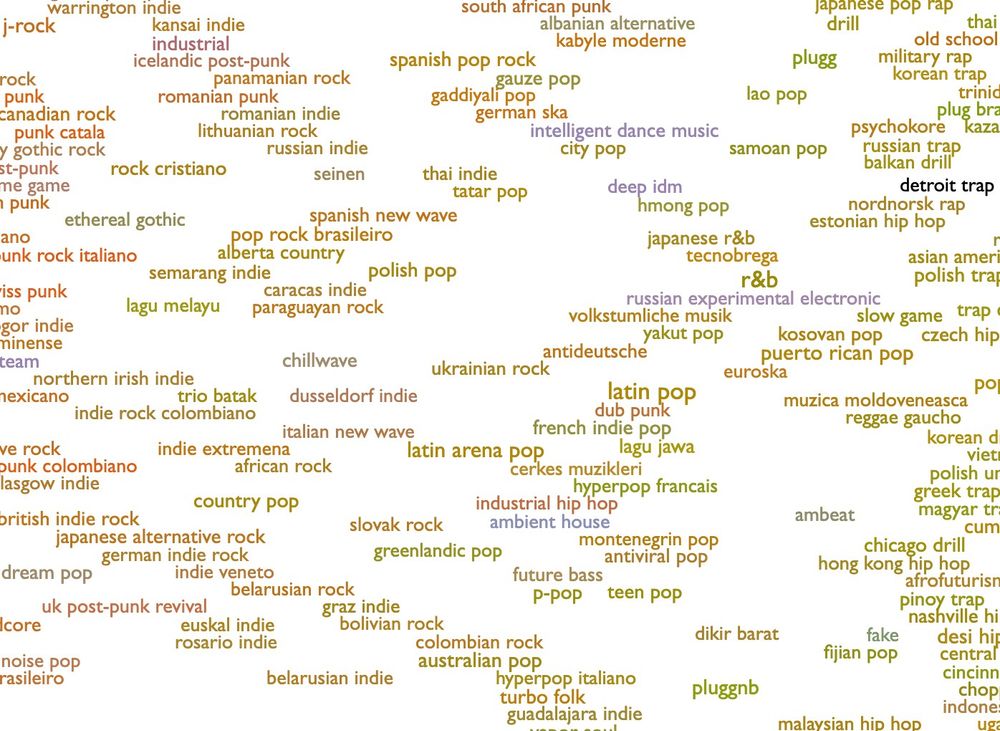
May 17, 2024 at 1:33 PM
To answer this, we needed several pieces of the puzzle. One key challenge was getting high-resolution genre tags (a rare thing!). We found them on everynoise.com, which has TONS of detailed genres – not just “rock” or “pop”, but “Ukrainian rock” or “country pop” /3
Take "emo rap" as an example. It's a new genre that rose to prominence in the 2010s, with depressive superstars Lil Peep ⬇️, XXXTenacion, and Juice WRLD as its central figures. Could it be that the fame of emo-rappers is related to time they joined this genre? /2

May 17, 2024 at 1:32 PM
Take "emo rap" as an example. It's a new genre that rose to prominence in the 2010s, with depressive superstars Lil Peep ⬇️, XXXTenacion, and Juice WRLD as its central figures. Could it be that the fame of emo-rappers is related to time they joined this genre? /2
Our new paper w/ @masonyoungblood.bsky.social & @oliviermorin.bsky.social. Are early members of music genres more popular than late adopters? Or: Is there first-mover advantage in music? We tested this question using ~1 mil songs from Spotify 🧵/1 epjdatascience.springeropen.com/articles/10....

May 17, 2024 at 1:31 PM
Our new paper w/ @masonyoungblood.bsky.social & @oliviermorin.bsky.social. Are early members of music genres more popular than late adopters? Or: Is there first-mover advantage in music? We tested this question using ~1 mil songs from Spotify 🧵/1 epjdatascience.springeropen.com/articles/10....
What are the best ways of clustering literary works by genre? In our new paper, @artjomshl.bsky.social & I compare 291 combinations of algorithms to find this out. Many findings are surprising: say, k of topics in LDA doesn't matter, or Euclidean distance is terrible 🤷♂️
www.nature.com/articles/s41...
www.nature.com/articles/s41...



March 22, 2024 at 11:02 AM
What are the best ways of clustering literary works by genre? In our new paper, @artjomshl.bsky.social & I compare 291 combinations of algorithms to find this out. Many findings are surprising: say, k of topics in LDA doesn't matter, or Euclidean distance is terrible 🤷♂️
www.nature.com/articles/s41...
www.nature.com/articles/s41...
On April 2nd I'll be giving a talk about my recent work for the #digitalhumanities center at Potsdam University – and online – so feel free to join if interested. (Note that registration is required.) www.uni-potsdam.de/de/digital-h...

March 18, 2024 at 1:13 PM
On April 2nd I'll be giving a talk about my recent work for the #digitalhumanities center at Potsdam University – and online – so feel free to join if interested. (Note that registration is required.) www.uni-potsdam.de/de/digital-h...


